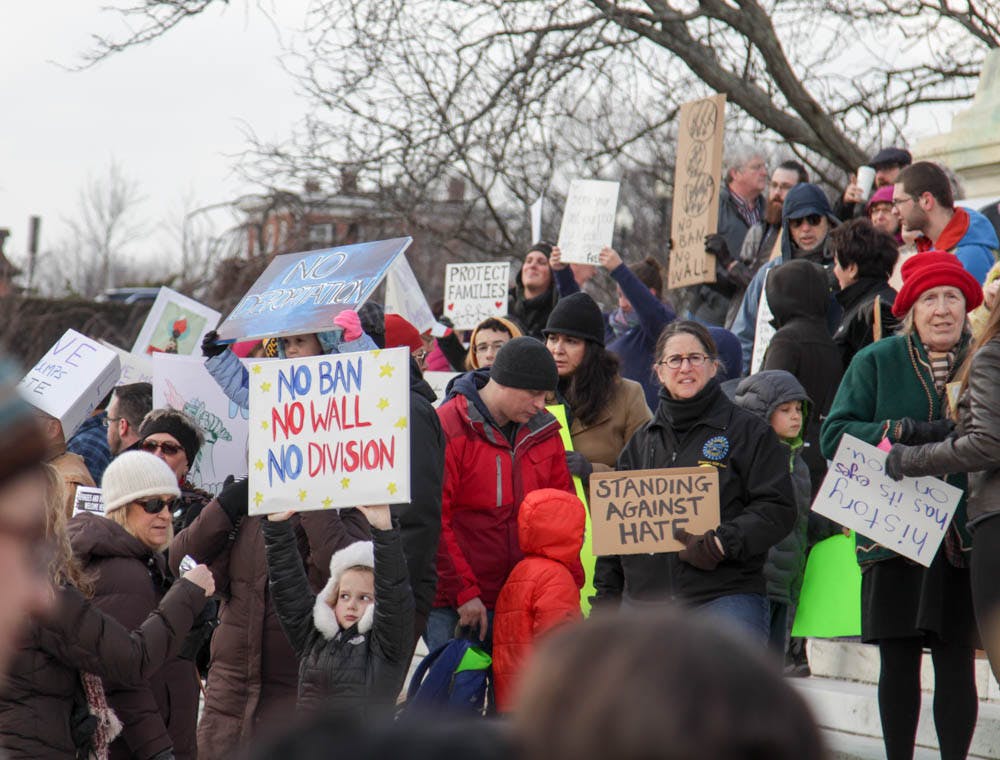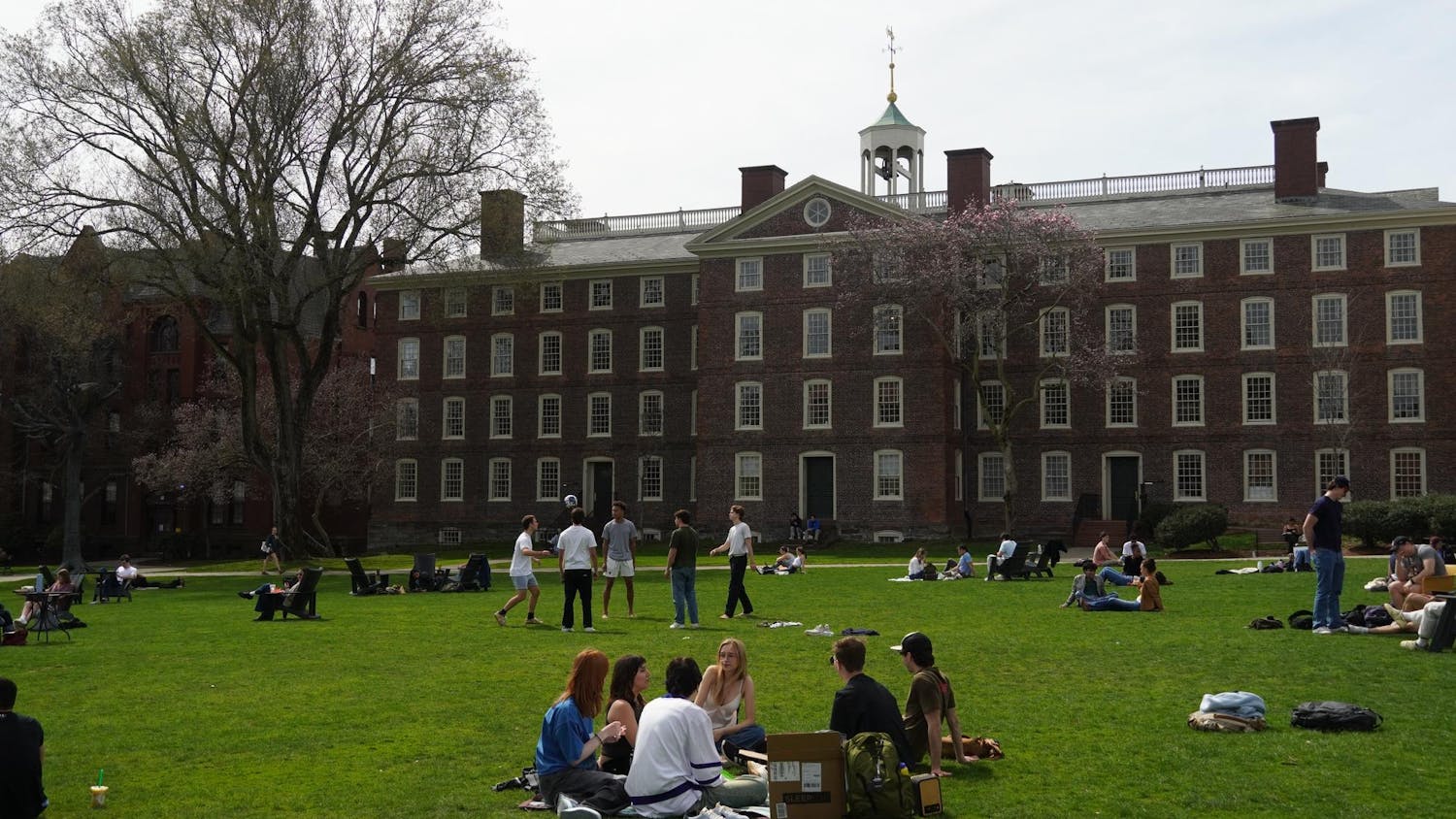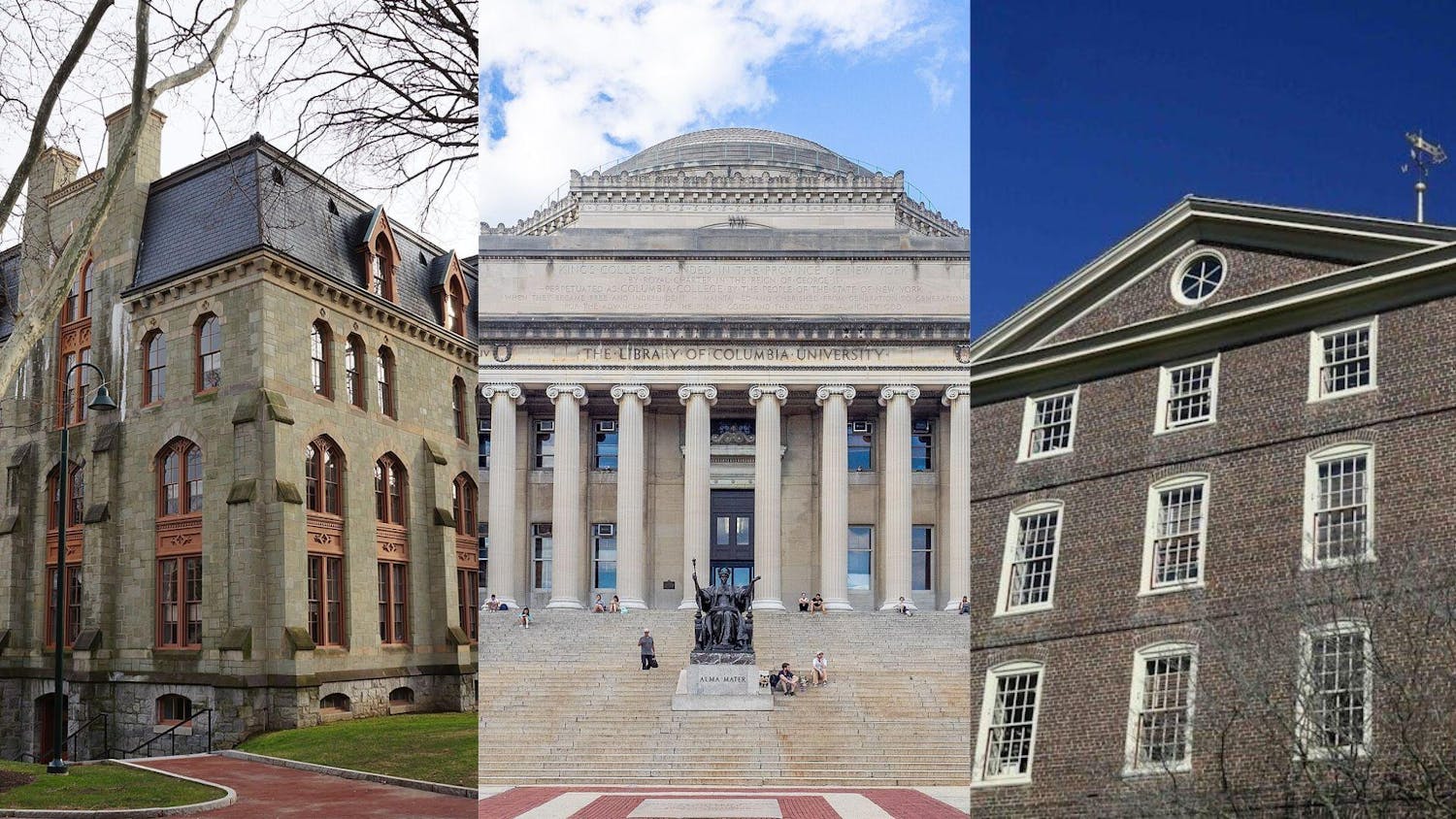[gallery ids="2824338,2824339,2824340,2824341,2824343"]
Fear, anxiety and outrage enveloped the Brown community Friday as Donald Trump signed an executive order that temporarily suspended the United States’ refugee program and banned immigration from Iran, Iraq, Libya, Somalia, Sudan, Syria and Yemen. Members of the Brown community from these nations will not be able to return to the United States should they choose to leave, and those still abroad cannot return to campus, according to Trump’s original executive order. However, since the order was signed, the Department of Homeland Security has stated that the immigration ban will not affect lawful permanent residents. The resulting confusion has left affected immigrants on campus with an uncertain future.
https://www.youtube.com/watch?v=CD7ZNvQ4vvg
State House protest
Hundreds of demonstrators gathered Sunday at the Rhode Island State House to protest the executive order. State representatives including Gov. Gina Raimondo and Congressman David Cicilline D-RI as well as Muslim and Christian leaders addressed the crowd from a stage placed beneath an excerpt from the Rhode Island State Charter inscribed on the State House facade: “To hold forth a lively experiment that a most flourishing civil state may stand and best be maintained with full liberty in religious concernment.”
They decried Trump’s executive order as a “Muslim ban” and declared it to be in stark conflict with the American values of welcoming refugees and religious liberty. After the speeches, protesters marched together to Nathan Bishop Middle School to an open meeting with Sen. Sheldon Whitehouse D-RI.
“What Donald Trump did was unconstitutional,” said Laurie Stein, a clinical social worker in Providence. She hopes that forthcoming rulings will “follow what this country is all about in terms of opening our borders to people who are escaping difficult circumstances in their countries,” she said.
Alan Gorchov-Negron ’17 said the executive order “is a human rights affront. So we should all band together” to fight it.
Uncertain future for students
Sara Kadkhodaei MA’12 PhD’16, an Iranian post-doc in the engineering department, said “the situation is really worrisome” for her and her husband. They were accepted to receive green card status and given work authorization almost a year ago. But with less than 90 days before their work authorization expires, they still have not received physical copies of their green cards. She says that immigration lawyers do not know how to advise her.
“This week, I really regretted coming to the (United States). I have been here for seven years. If I had been in any other country I would already have a passport. A few of my friends who went abroad — to Canada or Germany — have already become citizens of those countries because they have spent a lot of their lives there.”
Kadkhodaie came to the United States in 2010 on a single-entry visa. Her graduate studies were stressful because she was unable to visit her family until former President Barack Obama allowed Iranian students to apply for multiple entry visas, she said. This executive order erases that progress, she added.
On Sunday she went to a rally against Trump’s executive order in Boston. “When I see people who are not directly affected by this order supporting us, it really gives us hope. I understand that there is a difference between people and the government,” Kadkhodaie added.
Maya — a Syrian student whose name has been changed due to the potential repercussions of the executive order — said that she “thought that being in the US” would give her “the right of moving freely” — a right that was taken away from Syrians during the Civil War. However, for her and her fellow Syrians, the United States is “turning into another big prison,” she said.
“It’s injurious and shocking how these countries were mentioned as if they are responsible for the failure of politics in the world,” she added. “It’s so depressing when the (United States), one of the most developed countries, solves its problems in such a typical way. It’s the easiest way when you say, ‘Okay, these countries are responsible for our problems, so let us ban’” their citizens.
Maya said she values America’s cultural diversity the most, adding that when the U.S. government decides not to value this diversity, she feels unwelcome. Maya intended to travel to another country to visit her family members — who still live in Syria — as she does not feel safe returning to her country of origin. Now she cannot travel outside the United States because doing so would “end my dream of continuing my studies.” While she had planned to stay in the United States to pursue a graduate degree, she is no longer sure if this is possible as her student visa will expire.
Roksana Borzouei ’17, an American-Iranian dual citizen and president of the Iranian Student Association, said the executive order will make “traveling outside of the United States to Iran a shaky situation.” She said that she was not “surprised” by this executive order as it reminds her of H.R. 158, a legislative bill that allows the government to annually suspend certain countries’ citizens from applying for the U.S. Visa Waiver program if their home countries present a “high U.S. security risk.”
Sara al-Salem ’17, a former Herald opinions columnist from Saudi Arabia, also expressed concern for the new measure. “I’ve been scared of this from day one,” she said. She also noted that Saudi Arabia might be spared from the ban in the future given its role as an oil supplier, and that “the countries on the list are the ones America cares least about,” she said. Trump also has personal business ties to Saudi Arabia.
“The worst thing that could come out of this would be for Muslims to turn against each other,” she added, noting that not all Muslim students on campus were affected by the ban. She hopes this will not fracture student relations between Muslim students from different nations on campus.
Faculty members rally the community
As of Sunday, 78 Brown faculty members signed the Academics Against Immigration Executive Order petition. The petition opposes the ban on the grounds that it is discriminatory and “detrimental to the national interests of the United States.” A letter addressed to the Brown community with similar sentiments that urged faculty members to sign the petition had 98 faculty signatures by Sunday.
Rebecca Nedostup, an associate professor of history who signed the Academics Against Immigration Executive Order petition, said that when you recognize “incidents that you know from history — where families are literally separated at the border, or because of a very small shift in a legal definition of who is allowed to cross a border, all of a sudden people are stuck in limbo — you have to take action.”
Michael Kennedy, professor of sociology, said that he worries “that this is not just a ban but a provocation by the Trump administration to produce the very threat that justifies further repression.”
Richard Fleeter ’76 PhD’81, adjunct associate professor of engineering, said “to go to a Carrier plant in Indiana and say that we’re going to save those jobs and then” ban students and professors from predominately Muslim countries and make others feel unwelcome in the United States “is anti-competitive for the American education system (and) is not logical.”
Meenakshi Narain, professor of physics, said “freedom of thought and freedom of intellectual discussion is very relevant and promoted by scientific collaboration … saying that we cannot work freely on these research endeavors really impacts the future of research and the future of society,” Narain said. The measure has already had detrimental effects on her research and that of her colleagues, she added.
Narain was planning on having one of her graduate students help her conduct research at the European Organization for Nuclear Research, or CERN, in Geneva. However, because the student is Muslim, he is no longer participating as the University cannot “guarantee his return,” she said.
“People came literally across the world to make it,” Narain said. “If my student goes and runs the experiment but is then stuck there and cannot come back, how can he write his thesis? … It is a total witch-hunt and you cannot target students like this. It’s an attack on the fabric of humanity,” she added.
As inheritors of an American academic tradition that has benefitted from the contributions of refugees, faculty members are also grappling with how to broach the subject of the immigration ban in classroom conversations. Jeff Brock, professor and chair of the mathematics department, said, “We have to be aware of climate issues and sensitivity toward varying political dispositions. At the same time, I think it’s important not to apologize for the fact that one of the great strengths of our scientific and academic institutions in the United States has been their openness.”
In the midst of this uncertain political climate, faculty members have started to make accommodations for students affected by the executive order. With regard to the circumstances of one student who is currently stranded in Turkey, Dean of the School of Public Health Terrie Fox Wetle said her school “organized all of (the student’s) courses so that he can … continue learning and keep up with the academic schedule. We also made an outreach to the Congressional delegation to see if they could be of any assistance in both understanding the situation with his visa and to expedite (his return).”
“For students who cannot be here to attend classes, we think we can record the lectures and/or allow them to participate through teleconferencing,” wrote Ugur Centintemel, professor of computer science, in an email to The Herald. The CS department is currently aware of a PhD student who cannot return to the United States as a result of the executive order. “Once we assess the situation and identify the affected students and their status, we will work with the administration to support them as we go through this challenging period,” he wrote.
Administrative support
In a community email sent by Provost Richard Locke on Saturday, Locke stated that both he and President Christina Paxson P’19 “fully endorsed” the Association of American Universities statement urging the Trump administration to welcome students and scholars from around the world.
“This doesn’t just impact our international students ... it impacts the entire community which is why we’re all alarmed and troubled, but so vigilant about what’s happening right now,” said Shankar Prasad MA’03 PhD’06, associate provost for global engagement and strategic initiatives. “It really has caused us to question the core of the University’s mission which is advancing academic knowledge and research,” he added.
The University is responding to the executive order by “triaging the needs of our international community as they come up … and also thinking proactively about how to push back a little,” Prasad said. Administrators are “meeting with students this week from different parts of the world” to discuss how to move forward, he added.
Maya said that the University’s resistance to the executive order “really impresses me and makes me feel safer.” She added, “The University, all the community, supports me and is like family to me.”
“If any students, staff (members), or faculty (members) need any support they should absolutely reach out to my office. Ensuring that they know they’re a part of a community that is here to support them and that we will do everything we can is really, really important,” Prasad said. Along with the Office of International Student and Scholar Services, Prasad’s office serves as a legal resource for international students in the Brown community.
Borzouei said given the circumstances, the university needs to “commit fully to being a sanctuary campus.”





